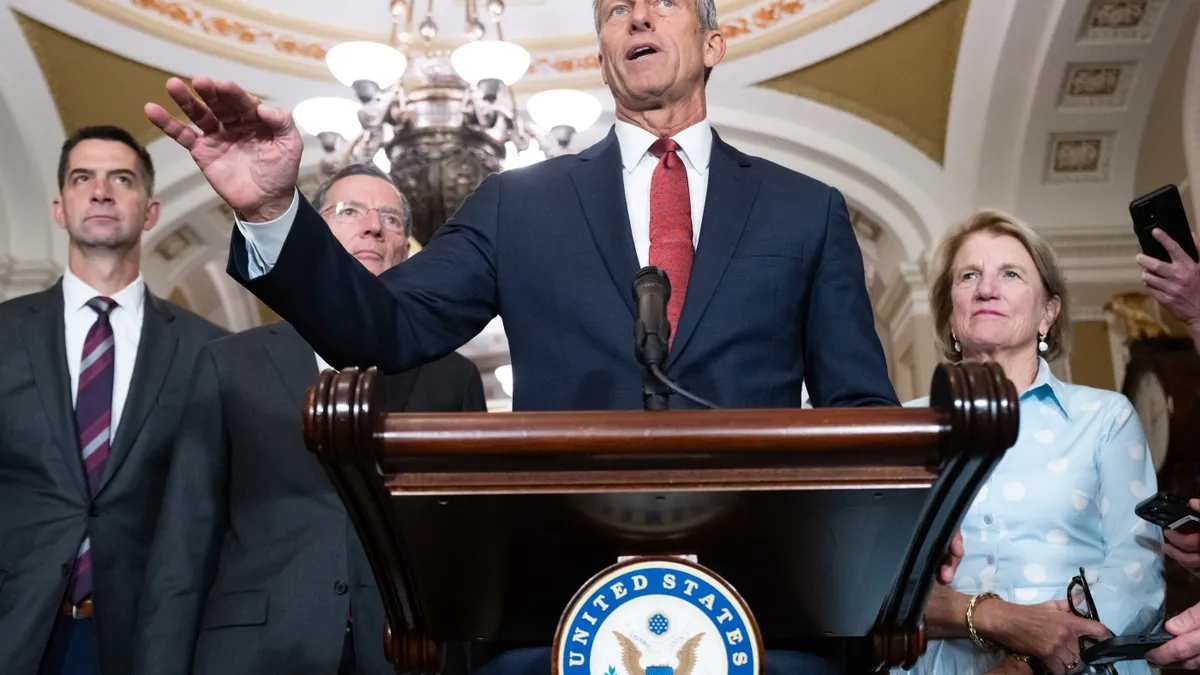
On Thursday, Senate Republicans encountered a significant obstacle in their efforts to pass a massive tax and spending package. A key provision aimed at garnering support for the plan by week's end was ruled against by a chamber official. The nonpartisan Senate parliamentarian, who plays a crucial role in determining which provisions can remain in the expedited bill, stated that the GOP's proposed changes regarding how states tax Medicaid providers do not comply with the rules necessary for passing the bill with a simple majority.
This ruling is particularly critical as it pertains to a provision designed to help offset the costs associated with the bill's proposed tax cuts. Just a day prior, Senate Republicans had introduced a $15 billion rural health stabilization fund intended to mitigate the impact of the reduced provider tax, which serves as a vital funding source for numerous states. Unfortunately for the GOP, the parliamentarian concluded that this provision would not be viable.
Democrats have seized upon this ruling, arguing that it represents a significant victory. Senator Ron Wyden, D-Ore., who serves as the top Democrat on the Senate Finance Committee, highlighted that this guidance has led to over $250 billion in health care cuts being removed from the Republicans' proposal. "Democrats fought and won, striking health care cuts from this bill that would hurt Americans walking on an economic tightrope," Wyden emphasized, asserting that he would continue to oppose what he termed a "morally bankrupt bill."
A senior Republican official, familiar with the discussions, informed NPR that the party remains committed to finding a solution to achieve the desired results and savings, downplaying the significance of the ruling. The provisions related to Medicaid have proven to be among the most contentious aspects of the bill. Central to the debate is a directive mandating states to reduce the tax they impose on Medicaid providers from 6% to 3%. Critics argue that this change will severely challenge rural hospitals that depend on this funding.
The Medicaid tax adjustment is part of a complex formula that determines how much federal funding is allocated through the joint program run in partnership with states. Additionally, the parliamentarian flagged other provisions for scrutiny, including one that would restrict Medicaid from covering gender-affirming care and deny coverage to certain Medicaid recipients who are not U.S. citizens.
Initially, Senate Republicans anticipated beginning the voting process on the legislation this week. However, it remains uncertain whether they will meet the deadline to send the bill to President Trump by the July 4th target date. The party is under intense pressure from Trump to finalize the legislation this week, with several members scheduled for a White House meeting.
This legislation encapsulates a significant portion of Trump's domestic agenda, yet the GOP conference has grappled with several unresolved issues. Despite significant amendments made by Senate committee leaders in recent days, funding for rural hospitals has emerged as a formidable barrier. The new Medicaid language incorporated into the House-passed bill has faced objections from key senators, including Susan Collins (R-Maine), Josh Hawley (R-Mo.), and Thom Tillis (R-N.C.).
On Wednesday, the Senate Finance Committee proposed a compromise stabilization fund, allocating $15 billion over a five-year period to support states in need. However, some senators, including Collins, argue that this fund should be closer to $100 billion to be effective. Hawley expressed concerns that Senate alterations would lead to prolonged negotiations with the House, potentially delaying the bill's final passage. Tillis, who is gearing up for reelection in 2026, cautioned that states would struggle to compensate for funding gaps resulting from the proposed cuts.
Senate GOP leaders await a determination regarding whether the major tax provisions in the bill comply with stringent rules that dictate what can be included. The parliamentarian continues to evaluate these elements to ensure they directly affect the budget and adhere to other regulations. Several provisions from the House version, such as one banning nationwide judicial injunctions, have already been eliminated in this review process.
Ongoing debates also surround the fate of energy tax credits, adjustments to the Supplemental Nutrition Assistance Program (SNAP), and provisions related to public lands. Senate Republicans are further navigating differences with House GOP lawmakers representing districts in New York and California, who insist on preserving the state and local tax break (SALT) that was negotiated with House Speaker Mike Johnson for constituents burdened by high state and local taxes.
Senate Majority Leader Thune can only afford to lose three GOP votes to successfully pass the bill. Fiscal conservatives within the Senate, such as Ron Johnson (R-Wisc.) and Rand Paul (R-Ky.), have expressed apprehensions regarding new deficit spending, which may compel them to oppose the plan. Even if Thune can resolve the issues within his chamber, various factions of House Republicans have indicated they will resist the emerging Senate bill.
Thune has repeatedly referred to Trump as the key figure in securing support for this significant legislation, betting on political pressure to compel Republicans to unite behind the package.